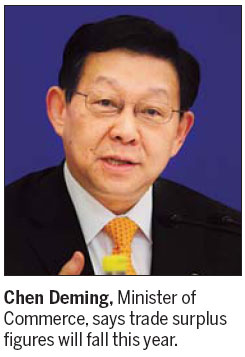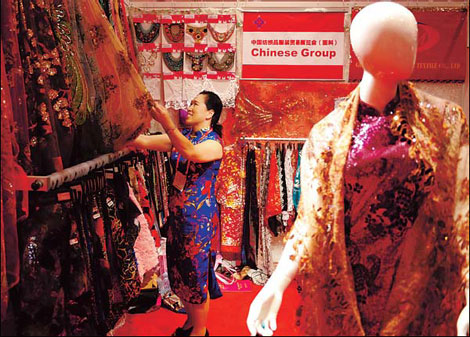Business
Trade surplus not worrisome: Chen
By Ding Qingfen (China Daily)
Updated: 2010-09-08 07:29
 |
Large Medium Small |
|
A customer chooses Chinese products at a textile show in New York. Shen Hong / Xinhua |
More steps on cards to boost foreign investment, says commerce minister
XIAMEN, Fujian - The trade surplus for the full year will continue to narrow on the back of steps taken by the government to boost domestic demand and imports, Minister of Commerce Chen Deming said on Tuesday.
The nation will also take steps to increase foreign direct investment (FDI), especially in the high-tech and services sectors, over the next two to three years, Chen told China Daily on the sidelines of the 2010 UNCTAD (United Nations Conference on Trade and Development) World Investment Forum.
"China's trade surplus has been on a decline, and imports are expected to rise on the back of the government policies. The trade surplus for this year will be maintained at a small and controllable level," said Chen.
The monthly trade surplus has been increasing over the last three months as export growth far outpaces that of imports. The surplus for July this year was as high as $28.7 billion, sparking fears that the monthly surplus will hover at around $20 billion for the rest of the year.
The trade surplus dropped to $190 billion in 2009, from $290 billion in 2008. During the first seven months, the surplus was $83.93 billion. But Chen sounded a positive note and said the concerns are unfounded and the annual figures would be smaller than last year.
Huo Jianguo, director of the Chinese Academy of International Trade and Economic Cooperation, said the continuous slowdown in export growth and possible accelerated growth of imports will help largely in achieving the targets. But at the same time, China also needs to be on guard against the growing trade protectionist measures adopted by other nations.

Though China's FDI fell 2.6 percent last year to $90 billion, the nation was still the second-largest FDI recipient after the United States.
"Foreign investment volume will surpass $100 billion in 2010, and a new wave of foreign investment is beginning. China's position as the most attractive FDI destination worldwide will be unchanged for some time," said Chen.
China is not too worried about the volume, but more importantly the quality of investment and its impact on economic development, he said. Chen's remarks assume significance as most of the FDI in China till now was largely in the manufacturing sector.
In April, the State Council launched new FDI guidelines that encourage investment in the renewable energy, services and high-tech sectors and also in the western and central parts of China.
During the first seven months, FDI grew by 20.7 percent year-on-year, and this, according to Chen, indicates the investment environment is only getting better and better.
"The nation's maturing infrastructure, improving labor quality and affiliated industries are combining to play a vital role in channeling more investments," he said.
China was the largest FDI recipient for 18 years till 2009. But at the same time, there is also enough room for the nation to make further improvements, said Chen.
Zhou Siyu contributed to the story.
China Daily
